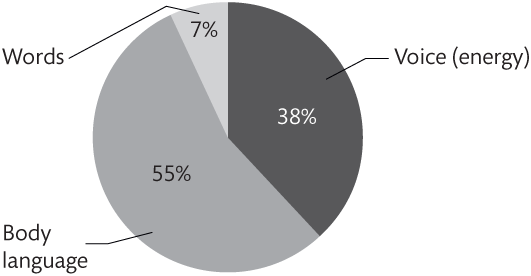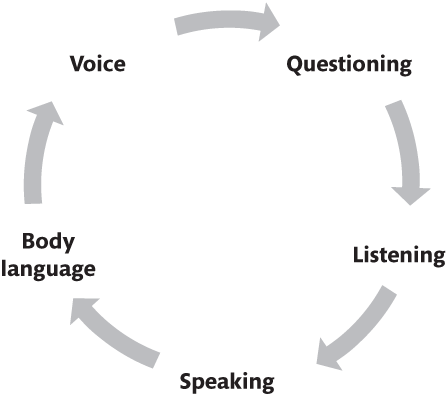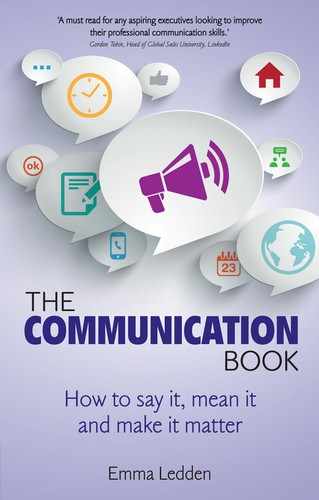I would like to introduce you to Dr Mehrabian.
Well not him so much as his famous communication model. This is it:

Source: Figure based on data from Mehrabian, A. (1981) Silent messages: Implicit communication of emotions and attitudes, Belmont, CA: Wadsworth.
This communication model claims when people are listening to you talk they judge you first by your body language, then by your voice and finally they judge what you say.
Let me start by saying this model does not mean your words or what you say are not important.
What this model is saying is that if your body language and voice (energy) are not saying the same things as your words, people will believe what your body language is saying first, then your voice and then your words.
For example, if you say you are really excited about something but speak these words in a quiet, monotone voice, looking at the floor and slumped over, people will have a hard time believing you are excited because you don’t look or sound excited.
Words + Body Language + Voice = Communication Success
Words – Body Language – Voice = Failed Communication
Body language is a silent language, but it speaks louder than words. What this means is that your everyday exchanges and communication are made up of your verbal (speaking and questioning) and non-verbal communication (how you look and behave).

So let’s look closely at the elements that make up your non-verbal communication. These include:
- how you look;
- how you sound;
- how you feel.
The great news is that all of the factors that make up your non-verbal communication are under your control.
How you look
Eye contact
Eye contact is one of the first things a listener notices about you. Having poor eye contact causes many problems in communication:
- Poor connection: you can’t establish connection with a listener if you don’t look at them.
- No feedback: you can’t get or give feedback to a listener if you don’t look at them.
- Look of nervousness: if you don’t make eye contact, at best you look nervous and at worst you look untrustworthy. This means the listener may question your credibility.
The solution to these problems is to establish deliberate eye contact with your listener. If you are talking to more than one person, make eye contact with each of them one at a time for approximately three seconds each. However, if one of them asks you a question, focus more on them while answering it. Equally, if one person is talking, make eye contact with them more while they are speaking.
Body language – two wrongs and a right
There are three ways your body language can be judged by your listener – passive, aggressive or assertive.
1. PASSIVE BODY LANGUAGE
How you look:
- slumped;
- your shoulders are forward;
- you shift repeatedly from one foot to another;
- your chin is down.
You sound:
- quiet;
- full of hesitations such as ‘em’, ‘ah’ or ‘um’;
- nervous.

2. AGGRESSIVE BODY LANGUAGE
How you look:
- tense/rigid;
- your chin is up or thrust forward;
- your hands are clenched, or pointing;
- you have sweeping arms;
- you give sharp, quick nods;
- you rapidly tap your pencil (like a drumstick) while listening.
How you sound:
- you have a loud, harsh voice;
- your statements sound like orders;
- overconfident.

3. ASSERTIVE BODY LANGUAGE
How you look:
- upright/straight;
- you lean forward while listening;
- you use casual hand movements;
- you have relaxed hands;
- you occasionally nod your head.
You sound:
- firm/pleasant;
- prepared/calm;
- energetic/passionate.

Look the business
When I was a teenager I wanted to be taller so I could be a model. I am only 5ft 6 and I wanted to be 5ft 9 at least. Believing this (my height) was the only thing standing in the way of my career as the next supermodel, I went on a quest to be taller. I just needed 3 inches; surely I could get them from somewhere.
PLAN A
I started with the basics – really, really, really high shoes. This was a terrible plan. They were extremely uncomfortable. I looked ridiculous walking in them, and at every single model casting I went to, they asked me to take my shoes off. Nooooo!!!
PLAN B
Late one night, while channel surfing, I discovered a product on one of those home shopping channels that promised, through exercise, to make you taller. Jackpot!
Apparently, it was going to grow the muscle between my spine to make me taller. It made absolutely no sense to me either, but hey, I was going to be taller.
You may not be shocked to learn I am still waiting for my ‘grow-taller exercises’ product to arrive in the post.
I never did manage to be the next supermodel but, in my quest to be taller, and indeed as a TV presenter in the years that followed, I did see and experience the power of dressing for success and, more importantly, dressing for confidence.
I believe dressing appropriately is vital. No, it can’t make you taller (trust me), or more beautiful, or change the fundamentals of who you are. However, it can make you look taller, feel more attractive, boost your self-confidence and help you make the right impression on those you meet.
Here are a few basics rules everyone should follow.
- Personal hygiene is important. You need to shower, you need to brush your teeth and you need to wear deodorant. Your clothes need to be clean and fresh and if you smoke, please be aware of how that smell impacts other people.
- Be careful you don’t overdo the perfume or aftershave.
- Your hair should be clean and groomed (my secret weapon to feeling more confident is a blow-dry).
- Dress for the industry you are in and as your listener would expect.
- Wear clothes that fit you properly, nether too big nor too small.
- Please don’t go to work dressed as though you are going to a night club (unless, of course, you work in a nightclub).
- Wearing black tights does not equal more skirt length; your skirt needs to be to the knee if you work in a corporate environment.
- Do not flash your underwear or cleavage at work, no matter how nice either or both are. Please see point number 6.
- If in doubt, be a bit more conservative than you think you should.
- Buy the best quality clothing you can afford.
How you sound
THREE ELEMENTS TO BE AWARE OF
- Posture: speaking is a physical act. Stand up straight and tall, place your weight comfortably on both feet and create a strong resonance chamber for your voice. If seated, sit up straight and plant your feet on the ground.
Position: face the listener completely and don’t cover your mouth when you are talking.
Passion: if you don’t genuinely feel passion and enthusiasm, this will come across in your voice.
Passion
Passion is an essential ingredient for your voice to be impactful.
Passion simply means you care about what you are talking about – you believe in your subject and getting to the communication goal.
Passion is the opposite of indifference. If you feel your message is boring and irrelevant, then this is how you are going to make the listener feel. You must be convinced of your message before anyone else can be.
HOW PASSION SHOWS UP IN YOUR VOICE
In natural speech, our voice range varies naturally between high and low throughout a conversation. However, sometimes due to nerves or lack of interest, people have little variation when they speak.
An additional problem with a lack of passion is that the speaker usually comes across looking unenergetic.
Your personal energy level has a major influence on the person you are talking to – either matching their energy level, raising it, or bringing it down.
We are all different. Whether you are naturally lively and outgoing, or innately thoughtful and reserved, you will definitely have a ‘range’ of energy levels. Get to know your personal ‘default’ level, and try to practise turning that default level up a notch or two and down a notch or two.
It’s important to have a good understanding of yourself and how you might need to ‘turn the energy up or down’ when you are communicating.
The power of the pause

When you are speaking it is very natural to talk through your information quickly. People talk fast due to nerves, lack of awareness or lack of preparation.
One of the most powerful communication tools available to you as a speaker is the pause.
A pause is when you stop talking, you take a breath in and then a breath out. It should last about three seconds, but those three seconds can feel like three hours. We all have an enormous urge to fill up every single second of the silence with our voice. Silence in a room can be very overwhelming for any speaker, especially in front of a group.
You must pause:
- for your listener to digest your messages;
- so you, the speaker, can breathe.
You need to embrace, plan and practise your pausing.
Most speakers don’t talk too fast, they simply don’t allow any space between their key points.
- You need to pause at the beginning of your communication, before you start speaking, to make sure the listener is ready to listen.
- You need to pause either before or after you make an important point.
- You need to pause when you give a hand-out or put up a slide to allow people to take it in.
How you feel
There are three common feelings that come up consistently for the people with whom I work:
- lack of confidence;
- nerves;
- being emotionally triggered.
Lack of confidence
I don’t have a magic solution to this obstacle. In my mind it is very simple: we feel confident about the things in our life we are skilled at. We are skilled at them because we work hard at them and have earned the right to feel confident.
To have confidence you must have experience of doing something a lot and belief you can do it without making a fool of yourself (this comes from the experience).
Confidence is not acquired easily and you don’t get it for free.
There is no short cut to real confidence. The reasons you don’t feel confident are:
- you lack the experience (the skill of communication);
- you are not preparing properly, or enough (you have not earned the right to feel confident).
The four steps to building your confidence as a communicator are:
- Do an honest inventory of your communication skills by asking for feedback.
- Look for opportunities to practise and get experience.
- Allow yourself a degree of failure in your interactions; you are not perfect.
- Ensure you reflect and learn from your mistakes.
Get more experience to build the skill and do more preparation and you will feel more confident in your exchanges.
‘Inaction breeds doubt and fear. Action breeds confidence and courage. If you want to conquer fear, do not sit at home and think about it. Go out and get busy.’
DALE CARNEGIE
Nerves
It can happen when you least expect it. It can happen when you are utterly unprepared and, annoyingly, when you have put hours of planning into your communication.
It can be a feeling – heart racing, stomach churning, head pounding, dizziness – not visible to the naked eye, but very overwhelming for the person experiencing it.
It can be a blushing that starts at your chest and runs the whole way up your neck and face. A physical shaking of your hands, legs or voice. It can be a fidgeting of hair, hands, clothes and anything else within arm’s length. These are the visible signs you are feeling anxious.
We all experience it and would pay anyone any amount of money to make it stop, make it go away.
What am I talking about? Feeling nervous, of course.
HERE COMES THE SCIENCE…
Anxiety or nervousness is the body’s way of responding to being in a life-or-death situation. What! How is talking to someone a life-or-death situation?
Even in our everyday interactions we fear embarrassing ourselves, fear we will be found out, fear we are not enough. You know that feeling, don’t you?
It is this very genuine ego fear that we all share, this ‘I will die of embarrassment if I make a fool of myself’ belief that triggers our fight-or-flight response. When this survival mechanism is triggered in our bodies it causes the feelings of nerves to hit us suddenly, unexpectedly and without mercy.
Embarrassing yourself in front of someone important is perceived as life or death for your ego, and that is why the feelings you get are so strong and real.
When this fight-or-flight response is triggered, adrenaline is rushed into your bloodstream to enable you to run away from or fight the dangerous situation.
This happens whether the danger is real, or whether we believe the danger is there when actually there is none.
What this simply means is your internal survival system can’t tell the difference between a real life-and-death situation and a communication scenario (where you might embarrass yourself).
The first step to managing your nerves is recognising this response and why it is happening. Your body is just telling you this is important and you don’t want to mess it up.
The behaviours that happen when you feel nervous are:
- self-talk/inner critic;
- avoiding eye contact with the listener;
- moving from foot to foot;
- talking fast;
- general fidgeting.
These behaviours help you cope with anxiety and yet they will take away from your messages and your communication goal.
I can’t tell you how to get rid of nerves, as this is not possible. Your goal is not to get rid of, but to accept and manage your nerves so they don’t overwhelm you. There are only two ways I know how to manage nerves. They are:
- Prepare fully.
- Mentally support yourself.
Ninety per cent of the success of your communication is in the preparation before you speak. You must use the tools in this book to know your purpose, understand your listener and prepare your words. You must practise out loud and ensure you know what you are going to say and how you are going to say it. You must do all this before you are in the real-life situation.
When the day comes and you are in the business scenario for real, you must try and calm yourself down and mentally cope with your nerves. You must challenge your inner critic and feel confident in the preparation work you have done.
Stop! Pause, take a breath and don’t react automatically to your feelings.
Ask yourself:
- What am I reacting to?
- What is it that I think is going to happen here?
- Is this fact or opinion?
- Am I getting things out of proportion?
- How important is this really? How important will it be in six months’ time?
- Am I overestimating the danger?
- Am I underestimating my ability to cope?
- Am I mind-reading what others might be thinking?
- What advice would I give someone else in this situation?
- Am I putting more pressure on myself?
- Just because I feel bad, does it mean things really are bad?
Being emotionally triggered
Imagine this scenario: you are interviewing for your dream job; you are prepared but are feeling a little insecure.
During the interview you have a feeling one of the people on the panel doesn’t really like you. You have no evidence of this. He hasn’t done anything specific, but it’s the way he looks at you. He seems bored by your answers and dismissive of your experience. At least, that is how it feels for you.
Then it happens. This interviewer asks you the question you have been dreading, in a tone of voice you feel is very condescending ‘Why should we choose you over the other candidates?’.
That’s what is said… but what you actually hear is ‘You are not good enough for this job and I don’t really like you’…
And that is what is called emotionally responding to a question.
You might respond emotionally because:
- it could be a very reasonable question asked in an aggressive or dismissive tone;
- it could be a question you hadn’t planned for and you feel under pressure to now give a perfect answer;
- it could be a question you simply don’t know the answer to and you don’t know how to handle it.
All of these situations have one thing in common. They will cause you to answer the question with emotion rather than fact. Why?
Because they have triggered your emotions: if someone asks you a question in a dismissive tone, it is normal to feel defensive or angry in return. If you feel you are going to be caught out, it is normal to go into self-survival mode and start scrambling for answers.
Finally, if you believe you should know everything, when the day comes when you are asked a question you don’t know the answer to (and it will come), you will become overwhelmed. Instead of just admitting you don’t know, you will react emotionally and show, through your emotions, that you don’t know.
When you are interacting with someone, questions can be asked in a way that causes an emotional reaction in you.
Stop! Do not answer the emotion part of the question, answer the fact part.
Respond to the data part of the question being asked and not the emotion it triggers in you.
Let’s go back to our condescending interviewer. He simply asked ‘Why should we choose you over the other candidates?’. This is a very reasonable question at a job interview. Maybe he did ask it in a patronising way, maybe that is how he talks, maybe he is nervous asking the question, maybe he doesn’t like you.
The truth is you simply don’t know, so be careful not to assume the worst. Be careful not to bring all your past emotional baggage into this new scenario.
WHEN ASKED AN EMOTIVE QUESTION YOU MUST:
- pause and breathe;
- not take the tone personally but manage your own emotion as best you can;
- ask them to repeat the question;
- be clear on what facts they want;
- answer the fact or data part of the question.
We are all guilty of responding to a situation today with the feelings of yesterday.

